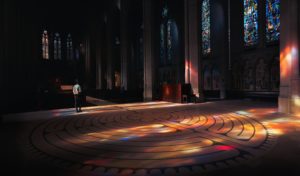 When you think about it, one of the consequences of sin being introduced into the world was an increased need for mankind. Mankind had it made. The table was set. God had provided all they ever could have wanted. Even the food required was generously given, simply for the taking. But, sin changed all that.
When you think about it, one of the consequences of sin being introduced into the world was an increased need for mankind. Mankind had it made. The table was set. God had provided all they ever could have wanted. Even the food required was generously given, simply for the taking. But, sin changed all that.
Yes. Once mankind ushered sin into the Garden the door was flung wide-open to a world whose need would continue to grow exponentially. Spiritual trials would necessitate help. As the physical elements would become increasingly challenging, man would need assistance. Food would become more difficult to acquire due to thorns and thistles. Drought would bring other agricultural burdens. Relational challenges in the marriage would demand support. Changing environmental hostilities would require different kinds of clothing to be worn; clothes to stay warm. Footwear to protect the feet. In time, medical ailments would need to be addressed.
The box had been opened; the needs (and wants) of an augmented mankind would continue to expand. The brilliant minds of many would feed this process. The agricultural, industrial and technological revolutions would move the ability to fulfill those needs to another level altogether. Needs. Needs, and more needs, with the increased ability to, at least in part, satisfy those needs if only for the moment. Man’s needs would be insatiable, in a world which once had all it could have asked for.
Those needs are not going away anytime soon, and in no way until the restoration of all things, but how interesting it is; that all-consuming demand of mankind to attend to those needs ushered in a platform for charity to mankind. Man had developed the ability to provide for some of those needs to their fellow man. The hearts of man had the opportunity to serve in the fulfillment to the ever-increasing and dependent humanity.
We see this done on a humanitarian level from many agencies and institutions, but to what end? Likely, often because of a heart of compassion. They feel in part the pain of an individual or people group, because they feel something of the heart of God, even if they don’t acknowledge that God.
For others, and I speak here of the Christian community, we have the privilege to serve the needs of man in order to honor God – to “Love our neighbor as ourselves.” This platform of unending needs grants to us the ability to serve God’s broken creation.
James communicates that this kind of action is part-and-parcel to our faith.
“What use is it, my brethren, if someone says he has faith but he has no works? Can that faith save him? If a brother or sister is without clothing and in need of daily food, and one of you says to them, ‘Go in peace, be warmed and be filled,’ and yet you do not give them what is necessary for theirbody, what use is that? Even so faith, if it has no works, is dead, being by itself” (James 2:14-17).
James brackets this “social gospel” with the understanding that our faith in a loving and compassionate God demands that we extend compassion to those in need; to do otherwise is to call the authenticity of our professed faith into question.
Our actions, however, are fueled, not by our desire for self-applause, but because those less fortunate are made in the image of God, and are worthy of our benevolence. But, we do have a higher and nobler goal, than simply clothing and feeding.
Jesus says in Matthew 5, “You are the light of the world. A city set on a hill cannot be hidden; nor does anyonelight a lamp and put it under a basket, but on the lampstand, and it gives light to all who are in the house. Let your light shine before men in such a way that they may see your good works, and glorify your Father who is in heaven” (Matthew 5:14-16).
God has so inspired the Christian to be a lamp of the Gospel; to allow all of darkened humanity to observe its hope. We are called to be lighthouses of this Beacon to the world.
Here’s the takeaway. This broken world needs Christ above all else. All of its needs, physical, emotional, mental, spiritual and otherwise are a platform wherein we can serve, where we can let our light shine. But our good works can never be void of the Gospel; we should never hand someone a coat and food and say, “See you later, I have fulfilled that need.” In doing that, we simply send them down the road, warm and fed, to an eternity of uncertainty. No, our good deeds should never absent of the expressed Gospel.
Who would have thought that it was sin, which creates a need, which offers an opportunity for service, which provides a forum for the Gospel?The needfulness of mankind opens the door for our good works. And, we give God the glory.
As we are able to fulfill some of the needs of people, we then have the opportunity to offer them Christ, and when it gets down to it; what greater need to they have?







Thanks for these wise words